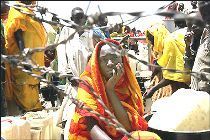UN concerned by lack of Darfur progress on ground
By Nima Elbagir and Opheera McDoom
KHARTOUM, Aug 18 (Reuters) – The United Nations said on Wednesday it was very concerned by Sudan’s lack of practical progress in bringing security to Darfur, where more than a million people have fled their homes for fear of militia attack.
 Sudan has less than two weeks to prove to the U.N. Security Council it has made progress towards disarming marauding Arab militias known as Janjaweed, or face possible sanctions.
Sudan has less than two weeks to prove to the U.N. Security Council it has made progress towards disarming marauding Arab militias known as Janjaweed, or face possible sanctions.
Khartoum’s plans to ensure security in the camps for the Darfur displaced had satisfied the United Nations, the spokeswoman for the U.N. special envoy to Sudan said.
“We are still concerned, very much so, by the lack of progress on the ground,” spokeswoman Radhia Achouria told reporters in Khartoum, referring to camp security.
“(Special envoy) Jan Pronk has said that he is very satisfied so far with the actual formulation of the action to be taken,” she said.
She added the next 10 days, including a visit to Darfur by senior U.N. officials in Khartoum on Aug. 26, would be “crucial and critical” in deciding whether Sudan was meeting the demands of a July 30 U.N. Security Council resolution.
Sudanese Foreign Minister Mustafa Osman Ismail said in Nigeria on Tuesday Sudan planned to double to 20,000 the number of police in Darfur to provide security.
On Wednesday he said he agreed the next 10 days were crucial for implementing the plans.
AFRICAN TROOPS
The African Union is also boosting its military presence. Rwandan troops arrived in Darfur on Sunday and a Nigerian contingent is expected to join them next week.
But Sudan’s director of the national authority for communications, Al-Tayyib Mustafa, called the entrance of the Rwanda troops a “provocative act” and said the Rwandans may be carrying AIDS.
Mustafa, a former state minister, told the Sudan Media Centre (SMC) he rejected the presence of the Rwandan troops and called on the government to make sure the troops adhered to correct health procedures before entering the camps for the displaced.
“(I) expect these troops to be carrying diseases specifically AIDS,” the SMC, a news agency close to the government, quoted Mustafa as saying on Wednesday.
After years of low-level conflict between farming communities and Arab nomads over dwindling resources, two groups launched a revolt in Darfur last year, accusing Khartoum of neglect and of arming the Janjaweed to loot and burn African farming villages in a campaign of ethnic cleansing.
Khartoum denies the charge and calls the Janjaweed outlaws. The U.N. estimates up to 50,000 people have died as a result of the conflict, either from violence or deprivation, and says the conflict has created the world’s worst humanitarian crisis.
Achouria said the United Nations was checking reports Darfur police had sexually abused displaced women in one of the camps.
She said the U.N. officials visiting on Aug. 26 would inspect safe areas for refugees designated by the government before moving people back.
“What they are expecting is a substantial, irreversible, sustainable change and … improvement in the security in the safe areas,” she said, adding it would also affect a perimeter of 20 km (12 miles) around the camp.
CHAD TO MEDIATE TALKS
Rebels and Khartoum are due to begin peace negotiations in the Nigerian capital Abuja on Aug. 23. Peace talks failed in July after the government rejected the rebels’ conditions.
Ismail said on Wednesday Chadian President Idriss Deby would be the AU mediator at the talks. The rebels have previously accused Deby of bias and refused to accept him as a mediator.
He added Libya had agreed to send protection forces to Darfur as part of the AU deployment.
The two main rebel groups were not immediately available to comment on whether they would accept Deby at the talks.
But a splinter group from the rebel Justice and Equality Movement (JEM) said in a statement on Wednesday it was not bound by a ceasefire signed by the two main rebel groups and Khartoum in the Chadian capital N’Djamena in April.
“We did not sign the N’Djamena agreement,” the rebel National Movement for Reform and Development statement said.
“(We) will resume our military operations against the government and its militias (Janjaweed) at any moment if the government does not … disarm the Janjaweed … and cease its military operations,” the statement continued.
